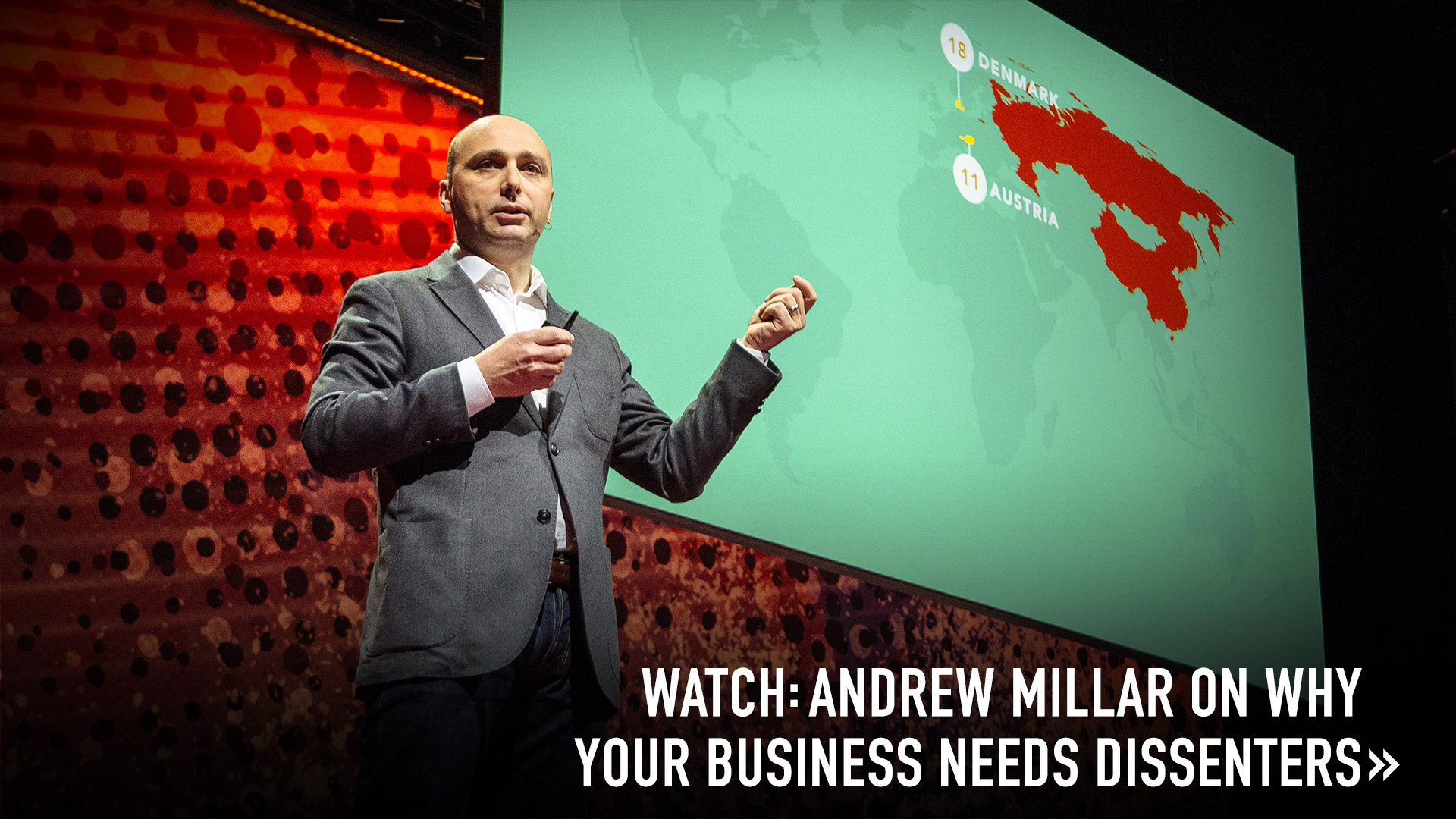
After being yelled at and terminated, writer Andrew Millar has finally learned how to make his mouthiness work for him. He shares some advice for his fellow dissenters and the coworkers who put up with them.
I’m a dissenter, and I live to disagree. In fact, I’m what I’d call a serial dissenter. I’m provocative and relentless, sometimes to the point of being annoying. Please know, though, that when I’m dissenting, it means I’m listening to you and I’m interested in what you have to say.
I believe we need to take better care of the serial dissenters among us. Don’t marginalize us; instead, make the most of our unique skill set.
So what exactly is a serial dissenter?
We are the people who just love to ask you questions. There you are, presenting the idea you’ve spent ages preparing, and then you ask: “Any thoughts?”
“Actually, yes,” we say. And we’re off.
“Have you thought about…?”
“Did you consider…?”
“Did you know…?”
“Why did you…?”
“Can you tell me more about…?”
We know that we can be a lot to take for people on the receiving end. Psychologist Judith Glaser has said that people seek connections and appreciation, not criticism and judgment. It’s true that when we speak up, our words can come across as criticism; never mind that our intent is usually connection. We see ourselves as caring enough about you and your idea to disagree with it, and our aim is to help you improve upon it.
A mentor of mine put it like this. He said there are three kinds of people:
Colluders, who need to belong more than they need to be heard.
Adversaries, who need to be heard more than they need to belong.
Dissenters, who need to be heard and to belong.
In workplaces where dissent is tolerated and even encouraged, you can see great stuff happening. At consulting giant McKinsey, the obligation to dissent is in your job description and their core values, making sure the customer comes before the firm. When Alfred Sloan ran General Motors, he’d postpone discussion where everyone agreed with him until there was “developed disagreement.” Successful hedge fund Bridgewater Capital (watch the founder Ray Dalio’s TED Talk: How to build a company where the best ideas win) credits its success to abiding by a policy of “radical truthfulness.”
History, too, shows that yes men are rarely the drivers of progress. There would have been no Manhattan Project had FDR not been willing to listen to outside advice and the Cuban Missile Crisis was only resolved by Kennedy actively seeking out dissent, in contrast to his handling of the Bay of Pigs.
I can’t tell you whether dissenters are born or made. I grew up in Scotland, where arguing could be introduced as an Olympic sport (and yes, we’d be champions). I now live in Australia ,where they could build an elite academy for bluntness and talking back.
Throughout school and early in my career, I got away with being mouthy, annoying and opinionated. I could usually talk my way into and out of arguments. But as my career progressed, I hit a ceiling created by my lack of awareness. I pissed off too many people, and my progress stalled. It was hard for me to accept compromise — or, as I saw it, mediocrity. Once, I was screamed at during a board meeting for being outspoken. I was fired from a job where my chronic disagreeing wasn’t welcome. Yet I didn’t stop.
Why? I was naïve. What’s more, I was outrageously wrong at times, and even though I knew that, I would insult people and refuse to back down. I really wish I could go back and shut my mouth for me.
But there were also times in my career when I wish I’d dissented more. I was once forced to hire someone who I knew just wasn’t ready for the job. However, to get along with the group, I relented. When I eventually had to fire this person, they attempted suicide. Shaken, I sought help through therapy.
That’s when my awareness of my behavior and its impact on other people increased, and I became better at controlling my urges to disagree. All of my experiences — even the painful ones — have ended up teaching me important lessons, which I’d like to share so we can all get along better.
Here’s my advice for my fellow dissenters:
If you’re a serial dissenter in a hierarchical or conformist company, you’re in the wrong place. You need to leave and find your tribe.
If you are going to dissent, you need to accept it in return. I struggle with that every day, but I work with a dissenter who reminds me, frequently, that I must continue to accept it.
Check your persistence. People will get tired of telling you to stop at times when you really should. Dissenters are not always right, but because we speak up and others don’t, our opinion often holds sway. Look for compromise.
Find a strong leader who supports you. You need someone who’ll watch your back, because even if you tone down your behavior, you’ll always make some waves.
Here’s my advice to everyone else:
If you’re a leader and you’re not comfortable with dissent, work on it. It’s your responsibility to see that everyone in your organization can contribute in their own way. If you feel threatened by a dissenter, ask yourself: Does dissent really hurt, or is it your ego? Are you concerned about losing control or afraid of being wrong? Listening doesn’t mean agreeing, but it does show you care.
Colluders, you want to belong, and so do we. However, we don’t need you to be relentlessly positive, so don’t promote that attitude by putting down dissent.
Adversaries, you need to be heard and so do we. Try dissenting against us; we’re comfortable with it and we will hear you out — although we will have something to say about it.
Always assume good intent on the part of the dissenter. It shows your humility and willingness to listen and your recognition of the fact that we all occasionally say things the wrong way. Let’s not be so harsh toward each other.
If you’re willing to hear us dissenters out, we will be willing to hear you out.
But, of course … feel free to disagree with me.













